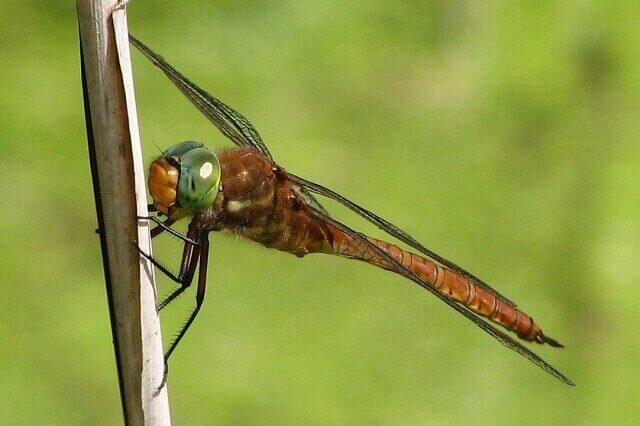
A once-rare type of dragonfly may have been aided by climate change, according to the Broads Authority.
Extinct from the Cambridgeshire Fens since 1893, the Norfolk Hawker was confined to breeding sites in the eastern regions of Norfolk and Suffolk until 2013. However, as average temperatures have climbed, it has expanded its range beyond historical boundaries.
Reports of sightings and egg-laying now extend to locations such as Lancashire, South Devon, Dorset, and Sussex, as documented by the British Dragonfly Society.
Since 1990, the initial spread from East Anglia has progressed westward from the Broads and southward along Suffolk’s coastal marshes.
Water quality improvements and habitat restoration, particularly in former gravel pit areas like Whitlingham Broad, have supported a local population around the southern outskirts of Norwich.
The Broads Authority attributes this recent colonisation to climate change, with habitat alterations also contributing significantly.
However, Dr. Pam Taylor from the British Dragonfly Society urges a cautious approach.
“Although the hawker’s overall range has expanded greatly, there are still huge gaps in its current distribution.
“It will need to infill many of these gaps before the species is truly secure in this country and only time will tell whether it will succeed.”
While acknowledging the positive impact of these environmental changes, the society expresses concerns about the future viability of wetlands amidst the threat of droughts.
The Broads Authority’s environment policy adviser Andrea Kelly said: “What appears to be good news about the spread of the Norfolk hawker and its potential relisting as no longer endangered, is in fact a call to action about the significant threats to its precious wetland habitat.
Wetland habitat loss poses a grave risk to dragonflies and other species reliant on wetland ecosystems, underscoring the ongoing challenges faced by wildlife conservation efforts.
——————————————————————————
At Natural World Fund, we are passionate about stopping the decline in our wildlife.
The decline in our wildlife is shocking and frightening. Without much more support, many of the animals we know and love will continue in their decline towards extinction.
When you help to restore a patch of degraded land through rewilding to forests, meadows, or wetlands, you have a massive impact on the biodiversity at a local level. You give animals a home and food that they otherwise would not have had, and it has a positive snowball effect on the food chain.
We are convinced that this is much better for the UK than growing lots of fast-growing coniferous trees, solely to remove carbon, that don’t actually help our animals to thrive.
This is why we stand for restoring nature in the UK through responsible rewilding. For us, it is the right thing to do. Let’s do what’s right for nature!
Donate today at https://naturalworldfund.com/ and join in the solution!

